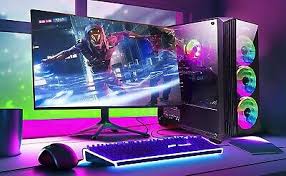
The Rise of Gaming Computers
Gaming computers have become a staple in the world of gaming, offering powerful hardware and performance capabilities that cater to the needs of avid gamers. With advancements in technology and a growing demand for immersive gaming experiences, gaming computers have evolved significantly over the years.
One of the key components that sets gaming computers apart from traditional PCs is their emphasis on high-performance hardware. Gaming computers are equipped with powerful processors, dedicated graphics cards, ample RAM, and fast storage options to ensure smooth gameplay and stunning visuals.
Customization is another hallmark of gaming computers. Gamers can personalize their setups with RGB lighting, cooling systems, and other accessories to create a unique gaming environment that reflects their style and preferences.
Thanks to the rise of esports and online multiplayer games, gaming computers have gained even more popularity. Competitive gamers rely on high-performance systems to gain an edge in gameplay, with features like high refresh rate monitors and low input lag providing a competitive advantage.
As technology continues to advance, we can expect gaming computers to push the boundaries of performance even further. From ray tracing graphics to virtual reality experiences, the future of gaming computers looks bright and promising for gamers around the world.
Top 6 FAQs About Choosing the Perfect Gaming Computer
- What are the best gaming computer brands?
- What specifications should I look for in a gaming computer?
- How much does a gaming computer cost?
- Can I upgrade components in a gaming computer?
- Do I need a gaming monitor for a gaming computer?
- Are pre-built gaming computers better than custom-built ones?
What are the best gaming computer brands?
When it comes to the best gaming computer brands, several names stand out in the industry for their commitment to delivering high-quality hardware and performance. Some of the top gaming computer brands include well-known names such as Alienware, ASUS ROG (Republic of Gamers), MSI, Corsair, and Razer. These brands are renowned for their innovative designs, cutting-edge technology, and reliable performance that cater to the needs of gamers seeking top-tier gaming experiences. Each brand offers a range of gaming computers tailored to different preferences and budgets, ensuring that gamers can find a system that suits their specific requirements for immersive gameplay.
What specifications should I look for in a gaming computer?
When considering what specifications to look for in a gaming computer, several key components are crucial for optimal performance. A powerful processor, such as an Intel Core i5 or i7, or AMD Ryzen equivalent, is essential for handling the demands of modern games. A dedicated graphics card from NVIDIA or AMD with ample VRAM ensures smooth visuals and high frame rates. Sufficient RAM, ideally 16GB or higher, helps in multitasking and running games smoothly. Fast storage options like SSDs provide quick loading times and responsiveness. Additionally, factors like cooling systems, monitor refresh rate, and connectivity ports should also be considered to enhance the overall gaming experience.
How much does a gaming computer cost?
The cost of a gaming computer can vary widely depending on the specifications and components chosen. On average, a decent gaming computer can cost anywhere from $800 to $1500 for a pre-built system, while custom-built gaming rigs with high-end components can range from $1500 to $3000 or more. Factors that influence the price include the processor, graphics card, RAM, storage capacity, and other features such as cooling systems and peripherals. Ultimately, the cost of a gaming computer is determined by the performance level and features desired by the individual user.
Can I upgrade components in a gaming computer?
Yes, you can upgrade components in a gaming computer. One of the advantages of gaming computers is their flexibility when it comes to upgrading hardware components. Whether you want to boost performance by upgrading the graphics card, increase storage capacity with a new SSD, or enhance multitasking capabilities by adding more RAM, gaming computers are designed to accommodate these upgrades. This ability to customize and upgrade components allows gamers to adapt their systems to meet evolving gaming requirements and ensures that their gaming experience remains optimal over time.
Do I need a gaming monitor for a gaming computer?
When it comes to gaming computers, the question of whether you need a gaming monitor is a common one among enthusiasts. While you can technically use any monitor with a gaming computer, investing in a dedicated gaming monitor can greatly enhance your gaming experience. Gaming monitors are designed to offer features such as high refresh rates, low response times, and adaptive sync technologies that can improve gameplay smoothness, reduce motion blur, and eliminate screen tearing. These features are especially beneficial for competitive gamers or those who prioritize visual quality and performance in their gaming setup. Ultimately, while a gaming monitor is not a strict requirement for using a gaming computer, it can significantly elevate your overall gaming experience.
Are pre-built gaming computers better than custom-built ones?
When it comes to the debate between pre-built gaming computers and custom-built ones, the answer ultimately depends on individual preferences and needs. Pre-built gaming computers are convenient options that come ready to use out of the box, often with warranties and customer support included. They can be a good choice for those who prefer a hassle-free experience and do not want to deal with the intricacies of selecting and assembling components. On the other hand, custom-built gaming computers offer greater flexibility in choosing specific hardware components tailored to one’s requirements, potentially resulting in better performance and value for money. Custom builds also allow for future upgrades and customization options. Ultimately, whether pre-built or custom-built is better depends on factors such as budget, technical expertise, desired specifications, and personal preferences.
